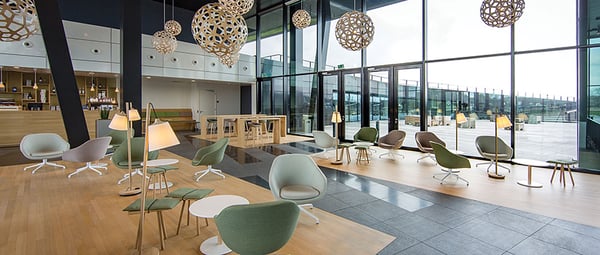Neurodiversity in the Civil Service workplace
You probably can’t tell by looking at me, but my brain works very differently to yours, writes Catherine Bean, a Fast Stream social researcher at the Office for National Statistics (ONS) is a member of the Analysis Function Diversity and Inclusion working group. As co-chair of the ONS Neurodiversity Support group, Catherine shares what life is like for her working in ONS.
 If you were to meet me, you’d probably notice that I’m short and my hair is in a bob. You might notice that I don’t often make eye contact. But you won’t see that I’m also extremely sensitive to bright lights and loud noises, I often miss conversational cues, and I’m hopeless at reading body language. Like around 700,000 people in the UK, I am autistic.
If you were to meet me, you’d probably notice that I’m short and my hair is in a bob. You might notice that I don’t often make eye contact. But you won’t see that I’m also extremely sensitive to bright lights and loud noises, I often miss conversational cues, and I’m hopeless at reading body language. Like around 700,000 people in the UK, I am autistic.
This isn’t an apology or an explanation for my ‘faults’; I’m proud to be autistic. I think autism makes me a strong analyst, and an asset to teams I’ve worked in. I love coding and problem solving, and I’m good at it too. I feel very fortunate to work in the Civil Service, and proud of the encouragement I’ve had here as an autistic person to succeed in my career.
I am part of the neurodivergent community, a group of people whose brain is wired a bit differently to the ‘average’ person (someone who is neurotypical). Neurodivergent people can be autistic like me, or have ADHD, Dyslexia, Dyspraxia or a range of other Neurodivergent experiences. As a co-chair of the ONS Neurodiversity Support group, and a member of the Analysis Function Diversity and Inclusion working group, I want to share how teams can best support their neurodivergent members.
Valuing the contributions of neurodivergent people and having different neurodivergent experiences represented is known as neurodiversity. Neurodiversity is an important and often overlooked aspect to diversity at work; but we bring huge strengths to our organisations, and there’s a lot that can be done to be more inclusive of our needs. The working world supports neurotypical people by default, and often neurodivergent people are left to advocate on our own behalf to get reasonable adjustments. Without good support, neurodivergent people like me may not progress in our organisations or may even leave jobs altogether.
If you’re not sure what I mean, think about the modern office. Nearly everywhere I’ve worked, most teams hot desk. As an autistic person I find this stressful; not knowing where I’ll sit can put my whole day out of step. This might sound baffling to some, but changes in my environment impact me more than most. To counter this, I like to have a reserved seat. Without being mindful of neurodivergent colleagues’ needs, you may unknowingly add extra stress to their days.
So, how can you create an inclusive environment and encourage neurodiversity?
As an analyst, I spend a lot of my day working at a screen. Inclusive technology is vital. Specialised technology to adjust for different ways of reading is incredibly useful, like colour filters for screens. I use dark mode on apps to reduce visual strain, and most coding environments support this functionality.
Additionally, managers must be mindful of different ways of working and communicating. Not everyone’s ideal working hours are nine to five; some people find they are more productive in the evenings or early mornings. Some people may find written summaries of meetings essential or might need to have a verbal conversation after receiving tasks via email to properly process the information. Some may need tasks explained more literally than others.
Many neurodivergent people have Workplace Adjustment Passports that travel through their Civil Service career with them. This gives information about their workplace adjustments to ease transitions between jobs. Crucially, managers shouldn’t feel unable to talk about neurodiversity!
When conversations are initiated by managers about working more inclusively, the burden is taken off individuals. Employees may not know the full extent of resources available to them, so it’s important for managers to be proactive in helping their teams succeed.
The past year has shifted how we communicate, and remote working has become the norm. To make online meetings more inclusive, make sure long meetings include breaks, minimise the use of the chat function as this can be distracting, and don’t always expect people to use their cameras.
These adjustments aren’t all specific to being neurodivergent, but instead suit a wide range of needs. The curb-cut effect. shows that by making positive changes to support disadvantaged members of society (in this case, making dipped curbs to allow wheelchair users to more easily cross the street), the whole of society benefits.
Dipped (or ‘cut’) curbs also support parents with pushchairs, tourists with suitcases and people on bikes. In the workplace, flexible working hours, which work well if you have fatigue problems (a common condition alongside being neurodivergent), can suit early birds and night owls, working parents and those with medical appointments and caring responsibilities. Being supportive of diversity in the workplace has positive impacts for everybody.
The best advice I can give is to have conversations with your colleagues to understand how work can work best for everyone. Make sure that everyone’s thoughts and opinions are listened to. You may find there are better ways of working that you hadn’t even considered, or the answers to problems you didn’t even know existed. A more diverse workplace means more innovation, more problem solving, and a better Civil Service. So, what are you waiting for? Start talking today!





